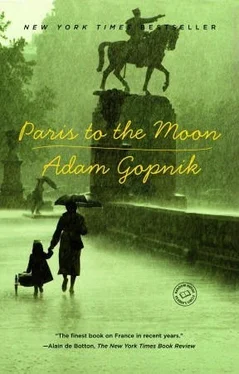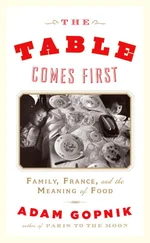The whole thing made no sense at all, as we all knew perfectly well the moment we left the classroom and went back out into the cold early winter air and headed for the Metro. The sum involved was both ridiculously small—Bucher was hardly about to be intimidated by it—and at the same time sufficiently noxious to keep a lot of people from wanting to offer it up. (I did not look forward to explaining to my own wife that we needed to pony up a hundred dollars in order to open up a new brasserie.) And to put it to a vote simply attenuated things still more. It was one of those bizarre decisions that are arrived at in protest meetings by a process of drift and uncertainty, in which a backwater suddenly for a moment looks like the way to the blue ocean and then, even when only moments later everybody knows that it’s a dead end, we still close our eyes and pretend that we are going somewhere.
I do not want to give the impression that once the drama and steak au poivre had been removed from our movement, it lost momentum or seriousness. The classroom was full; the debate was intense; the purpose was firm. It was just that the strongest part of our case was its presentation, and once we moved away from our proscenium, there was not very much we could do. We had moved in a single November night from ideology to politics—from what you want to what you do—with the usual disappointing results. “We have gone from ’68 to ’81 tonight,” a friend sighed in my ear as we walked home. He meant that we had gone from Utopian vision and slogans to the realities of the assumption of power, or from Mao (the make-believe French Mao) to Mitterrand.
I walked all the way home from the Twelfth, across at the Gare d’Austerlitz and then all the way along by the river. It was a cold night, winter really, and the few leaves left on the trees shivered sympathetically above, like waiters carrying trays.
On November 30, that Tuesday, we met with M. Bucher early in the morning at La Coupole, the vast twenties brasserie that he owns down on the boulevard du Montparnasse. It was eight-thirty in the morning—much too early, we all agreed—but that had been M. Bucher’s hour, and we did not want to change it, I suppose for fear of seeming sluggish.
Bucher was as agreeable as ever. This time, though, instead of the short sleeves and open shirt that he had worn at our first breakfast together at the Balzar, he wore a suit and tie, pressed tightly over his belly. He began by smiling and shrugging and making the significant admission that maybe M. Delouche, the new maitre d’, was the wrong man to be fronting the Balzar. He complained again about the mediatisation, meaning, I think, M. Quelin and Le Monde, which Lorenzo agreed had been unfortunate, but then pressed on to his hard, blunt point: The garcons will leave with a fat envelope, and that’s it.
“They drove the old owner into the bushes like a hunted animal,” he says scornfully. “Not me. All this”—he meant the war of the garcons—“ belongs to another century.” He caught himself, knowing that he mustn’t seem too harsh, too “liberal.” “But you know, on reflection, that’s why I like it. I value it. That’s why I want to be a member of your organization.”
He agreed, after much tender pushing by Lorenzo, to meet himself with the garcons. The strike had shocked him. “Ninety-five percent of my media is about Balzar and point two percent of my business. Listen, I’ll talk to them, I’ll try to make them happy. But if they want to leave with a fat envelope, they can leave.” He swore, forcefully, that there are no tour groups admitted to the Balzar.
Then Bucher did something, amazingly, intuitively shrewd. Before he had always spoken of the alternative to his ownership as McDonald’s—“Listen, if you don’t want me, maybe McDonald’s will take over”—and we knew this to be pure rhetoric; McDonald’s was not about to take over the Balzar, in the first place, and in any case, McDonald’s bashing of that kind was too generalized, too vague an ideological gesture to have any weight. It was a purely rhetorical turn, recognizable as such. But now he turned to another potential owner.
“Listen,” he said, “I hear you’d like me to sell. OK. Maybe you want me to sell out to M. Conran? I’m sure he would love it.” Terence Conran is the English restaurateur and furniture tycoon who a few weeks before had just opened his own new brasserie, L’Alcazar, over on the rue Mazarin. It was the first attempt by a major figure of the London cooking renaissance to establish a beachhead in Paris, and it had been getting a lot of press.
Bucher shrugged. “I think he has nothing to teach us about how to run a brasserie. I’m trying to defend a ‘Franco-Francais’ tradition but…”
A little of the air seemed to pass right out of our movement at that moment. The anti-Americanism that lent a piquant, alarming note to the Balzar wars had been, as anti-Americanism most often is in France, not quite real, an abstract idea, a speech act with very few barbs in it. (Lorenzo, Claude, and I had once had a long debate, over dinner, about the relative merits of John Coltrane, whose pianist, McCoy Tyner, Lorenzo’s brother had studied with, and Cannonball Adderley, favored by Claude.) Anti-Americanism in France at the end of the twentieth century is in fact in some ways like anti-Catholicism in England in the nineteenth century. It is a powerful, important, influential, official doctrine, but it is also not entirely real: English people imprecated against the Catholics and the pope, but that didn’t stop them from loving Venice, traveling to Florence, worshiping Raphael, and filling their houses with Italian pictures. Even the much-publicized fusses about American mass-produced food and French peasants “trashing” McDonald’s are almost pure media events. The French farmers knock down a McDonald’s for the benefit of the French media, which publicize it in Le Monde in order to see what The New York Times will have to say about it the next day. Anti-Americanism has enormous life as an abstract ideological principle and a closed circle of media events of this kind, but outside of a tiny circle on the elite left and, surprisingly, a slightly larger one on the elite right, it has almost no life as a real emotion. But suspicion of the English is a permanent feature of the French psyche. Anti-English sentiment in France is like anti-French sentiment in nineteenth-century England: inarticulate but real. Those people just annoy the hell out of you. This contempt for the English, as opposed to the love-hate relation with Americans, is seen, for instance, in the almost open disdain that the French press has displayed in its investigation of the death of Diana Spencer, as it prefers to call her. Or at a more obscure level it can be seen in the magazine Le Point, which is usually pro-American in the neutral, hidden sense (it runs endless reviews of American music and movies and television), but when it ran a cover story on the British invasion of the Dordogne, the story was full of mistrust and contempt.
So for Bucher to say that McDonald’s was coming was a mere ideological gesture, instantly seen as one. But to say that he could sell out to Terence Conran was to speak to a real, and completely annoying, possibility. Afterward, when our committee gathered in a café across the street from La Coupole, with two new members of the group—whom I didn’t know but whom Lorenzo had invited along after the meeting earlier that week, Lorenzo having a good left democrat’s desire to keep the leadership in touch with the masses—we all felt unhappy. The two new guys were sure that there was a complot of some kind, a hidden history, that was being kept from them. Discussing the possibility of our new Balzar, they also seemed unable to accept the logic of capitalism in any form, including one we would own ourselves.
Читать дальше












